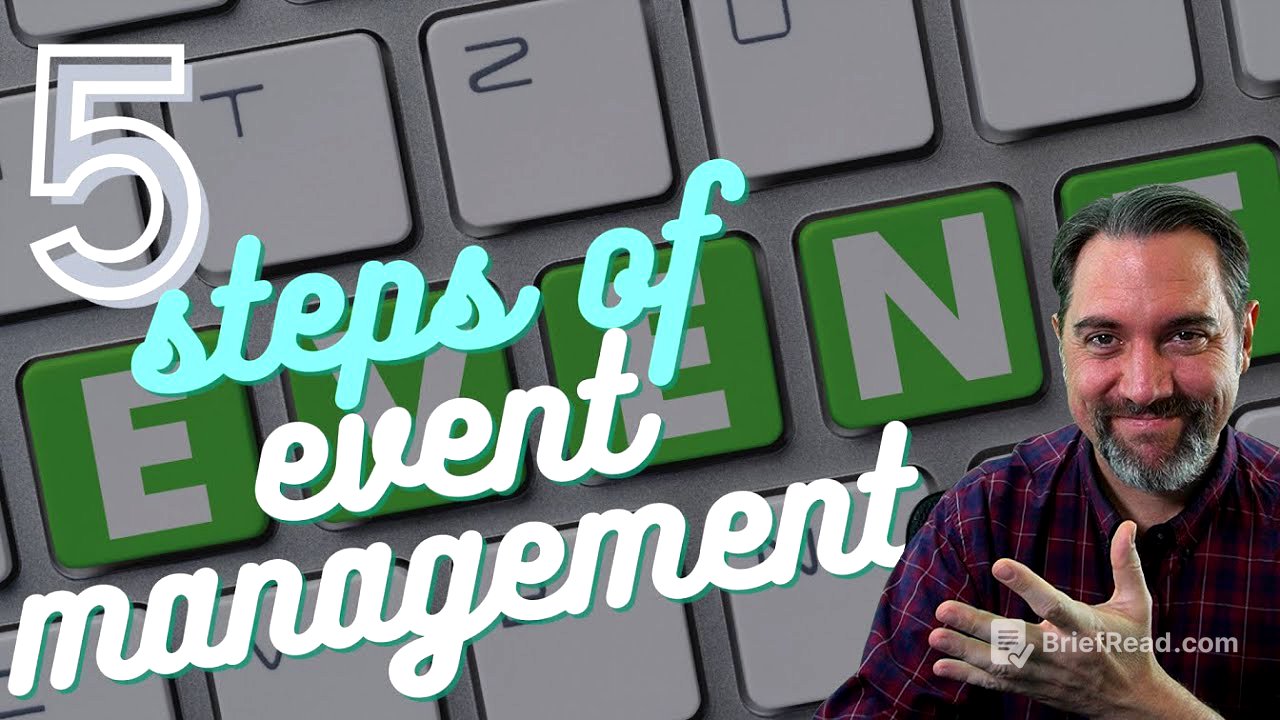TLDR;
This video outlines the five key stages of event management, emphasizing the importance of assembling the right team for each phase. It covers pre-event planning, marketing and promotion, organizing and operations, hosting, and follow-up, highlighting how these stages intertwine and contribute to a successful event, whether online, in-person, or hybrid.
- Pre-event planning involves defining goals and assembling a core team.
- Marketing and promotion start early to build anticipation.
- Organizing and operations cover all logistical details.
- Hosting focuses on direct engagement with participants.
- Follow-up measures success and informs future events.
Introduction [0:00]
The video introduces the concept of online event management as a valuable skill for promoting services, businesses, and engaging in the tourism and hospitality industry. It emphasizes the increasing demand for creating special online experiences and highlights the importance of assembling the right team to execute successful events. The video will cover the five major stages of event planning from start to finish.
Why stages in event planning? [1:10]
The trend of events moving online is discussed, including concerts, sporting events, and meetings. The stages of event planning remain consistent whether the event is online, in-person, or hybrid. The video aims to explain the five stages of event planning and the teams needed to ensure a successful and cohesive event.
Pre-event planning and brainstorming [2:17]
The first stage, pre-event planning, involves a core team of managers and idea people making major decisions. The primary goal is to define what the event hopes to achieve, aligning the goals of both the organizers and the attendees. This stage includes deciding on a name, basic concept, time of year, venue (or online platform), value to participants, and pricing. Identifying the necessary roles, such as a Zoom meeting manager, graphic artist, or virtual reality expert, is also crucial during this phase.
Marketing and promotion [5:11]
The second stage focuses on marketing and promotion to create awareness and gather participants. Marketing efforts should begin even before all event details are finalized. Key activities include developing taglines, creating a logo, making design decisions (colors, graphics), sending invitations, and establishing consistent communication channels and hashtags. Understanding the target audience and their motivations is essential to inform marketing decisions, such as choosing appropriate advertising methods and identifying relevant contacts.
Organizing and Operations [7:50]
The organizing and operations stage involves managing the numerous details necessary for the event. This includes managing volunteers, handling payments, securing insurance, and creating a detailed schedule. Curating talent, entertainment, speakers, and hosts is also part of this stage. Risk management is crucial, with contingency plans in place for potential issues like internet outages or technical difficulties. The operational phase extends into the day of the event, with ongoing adjustments and modifications.
Hosting [10:37]
The hosting stage involves the direct interaction with participants through hosts, MCs, and presenters. These individuals welcome guests, provide orientation, ensure comfort, and offer technical assistance. Training hosts to be helpful, courteous, and kind is essential. Effective hosting is critical for the event's success and can influence future events.
Follow-up [11:37]
The follow-up stage occurs after the event and is crucial for assessing its success and planning future events. It involves monitoring audience reactions, gathering information through photos, interviews, and surveys, and determining if the event's goals were achieved. This stage includes writing blog posts, sending thank-you messages to presenters and guests, and keeping the conversation going to maintain engagement. Reminding participants of the event's success and inviting them to future events is also important.
Review of the timeline [14:27]
The event planning process involves a dynamic interplay between planning, promoting, and organizing. The management team oversees these stages, which are not strictly sequential but rather meld together. The follow-up team may collaborate with the marketing team to align communication channels and gather feedback through pre-surveys, ensuring that expectations are met.
Learning more [15:53]
The video promotes a course on mice tourism, event management, and virtual reality creation available at togetherlearning.com for those interested in learning more.









